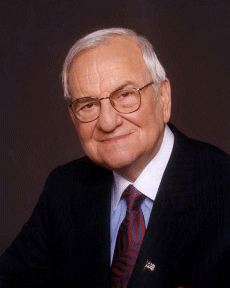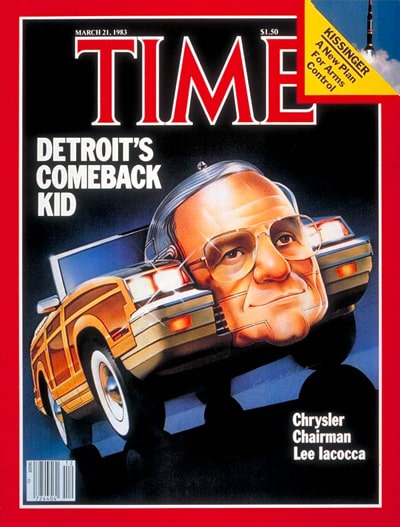Lee Iacocca, born Lido Iacocca on October fifteenth 1924, was the son of an Italian immigrant named Nicola Iacocca. He had one sister named Antonette. The family lived in Allentown, Pennsylvania. His father was somewhat of an entrepreneur in the food service industry. The family business was called the Orpheum Weiner House in Allentown, Pennsylvania.
The company is still standing today, operating under the name Yocco’s, his uncles’ are still making hot dogs for the public. Growing up in  Allentown was difficult for Lee, because of his ethnic background. Allentown was primarily made up of Dutch immigrants. In his early years of education he was ridiculed for his heritage. An his senior year in high school Lee came down with rheumatic fever. He had a harsh bout with the disease because there was no modern medicine to aid in the recovery. In 1941 during the World War he was very excited about joining the military. Ironically, the illness that had almost killed him, saved him from going to war. Most of his classmates that joined the service had been killed over-seas and abroad. For college Lee chose Lehigh University for its engineering program, although he wanted to go to Purdue, he did not get a scholarship. Lehigh University was one of the sights that Ford Motor Company used to recruit new employees. He was able to secure a place in the Ford training program, it was difficult for him to get admission but he survived. During his time in the training program Lee had become less interested in the engineering aspect of the business and more in sales. He dropped out of the program to pursue areas in sales with the Ford Corporation.
Allentown was difficult for Lee, because of his ethnic background. Allentown was primarily made up of Dutch immigrants. In his early years of education he was ridiculed for his heritage. An his senior year in high school Lee came down with rheumatic fever. He had a harsh bout with the disease because there was no modern medicine to aid in the recovery. In 1941 during the World War he was very excited about joining the military. Ironically, the illness that had almost killed him, saved him from going to war. Most of his classmates that joined the service had been killed over-seas and abroad. For college Lee chose Lehigh University for its engineering program, although he wanted to go to Purdue, he did not get a scholarship. Lehigh University was one of the sights that Ford Motor Company used to recruit new employees. He was able to secure a place in the Ford training program, it was difficult for him to get admission but he survived. During his time in the training program Lee had become less interested in the engineering aspect of the business and more in sales. He dropped out of the program to pursue areas in sales with the Ford Corporation.
During his time at Ford Lee Iacocca came out with several very innovative purchasing concepts. One concept was the 56 for 56 payment plan. This payment plan would allow the consumer to purchase a new Ford vehicle with a twenty percent down payment and a $56 monthly payment until the vehicle was paid off. This was one of the first payment plans that were structured to be affordable for the consumer. The system was responsible for selling over seven hundred fifty thousand vehicle in 1956. Although his career with the Ford Motor Company was extensive, all that would come to an end with the production of one vehicle the “Pinto”. After Ford was able to settle law suits over the compact car for explosive reasons, (the Pinto was noted for exploding from rear end collisions), they recalled over a million and a half Pintos. This was June of 1978, one month before Lee was fired.
In 1979 Lee Iacocca was employed with the Chrysler Corporation. Within his first few month there he had seen Chrysler cancel production of over sixty thousand cars. After a short period of time he found out there were no dealers to sell cars for them. Their inventory was bulging because of cars that were made with no destination. These vehicles were part of Chrysler’s sales bank. It was a large inventory of cars that were manufactured only to keep plants running.
One of his first ideas was to get rid of the sales bank. He put pressure on all local dealers to empty the inventory. He made the dealers take up  the slack so he could implement a just in time form of inventory. They would be manufacture specific orders so no capital would be wasted. Another problem with Chrysler was they were leasing vehicles to rental agencies instead of selling to them. Chrysler had been running the world’s largest leasing company. Every six months they would buy them back. The new car dealers wanted nothing to do with the rented cars. With this policy in effect, Chrysler also made itself the world’s largest used car broker.
the slack so he could implement a just in time form of inventory. They would be manufacture specific orders so no capital would be wasted. Another problem with Chrysler was they were leasing vehicles to rental agencies instead of selling to them. Chrysler had been running the world’s largest leasing company. Every six months they would buy them back. The new car dealers wanted nothing to do with the rented cars. With this policy in effect, Chrysler also made itself the world’s largest used car broker.
In late 1979, early 1980 Chrysler had wrote off almost 88 million dollars in used car losses. Between the inventory problem and the leasing issue, Chrysler’s loss was in the five hundred million dollar range. The next item was the staff. He needed to replace over thirty five stop level managers, and replace them with people that knew what they were doing. With over twenty years of experience with Ford it was clear were the replacements would come from. Sales continued to drop steadily until the creation of the K car. These were compact vehicles that would put Chrysler back in the market place or finish them off. The present problem was that Chrysler had such a large debit already with no fresh capital. Through the help of government loans and an improving economy Chrysler was able to save itself. By giving more of the market share Chrysler was on the way to recovery. Presently the corporation holds a very large piece of the market from large trucks to compact vehicles.
Lee Iacocca was able to save a failing company by establishing a competent management team, cutting production runs of vehicles without destinations and arranging guaranteed loans from the Federal Government during an uncertain time. Interest rates were very high and the customer base was low. He had an extensive amount of fore thought by staying with the firm. His guidance was able to save and American corporation. With the successful turnaround of the Chrysler Corporation there was a lot of gossip and allegations that Lee would be seeking a political career. In 1983 he signed a three year contract with Chrysler to close his career. In 1986, he retired from the car manufacturing industry completely. In my opinion Lee Iacocca was blackballed from one of the world’s largest auto manufactures, then was placed in charge of a company that had little chance of survival in the present economy. He turned the struggling company around and repaid all debits owed by the Chrysler Corporation. There is one phrase he also said that will be remembered for years to come, “If you can find a better car, buy it.”
